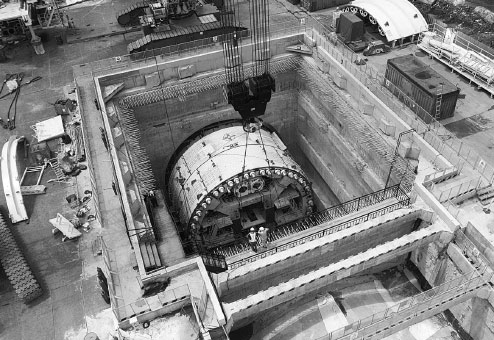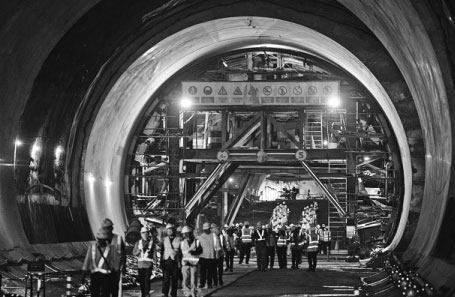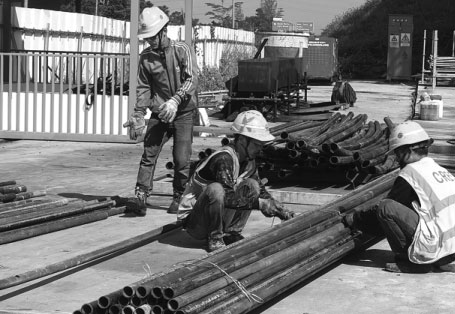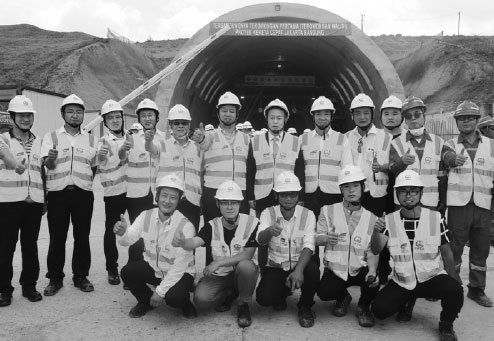Rail project broadens horizons in Indonesia
Jakarta-Bandung HSR expected to be completed by mid-2021, using Chinese standards
Using GPS survey equipment to conduct rail track measurements is one thing Vernando Tinambunan finds fascinating about his job.
Tinambunan, 26, is a senior student in engineering at Sangga Buana University in Bandung in Indonesia's West Java Province. Eight months ago, he joined the Jakarta-Bandung High-Speed Railway, or HSR, project and now works as a technician at a local branch of China Railway Group.
Such GPS survey equipment "is new to me", said Tinambunan.
"This is so interesting."
Carried out by Kereta Cepat Indonesia-China, a joint venture formed by Chinese and Indonesian state-owned enterprises, the 142-kilometer railway will connect the Indonesian capital with its third-largest city.
Since the memorandum of understanding was signed between the two countries in March 2015, the high-speed link has been regarded as a flagship project under the Belt and Road Initiative that has synergy with Indonesia's Global Maritime Fulcrum vision.
Launched by Indonesian President Joko Widodo in 2014, the Global Maritime Fulcrum aims to capitalize on the country's geographic location in the region to promote its strategic and economic development.
The $6-billion Jakarta-Bandung HSR project, to be completed by mid-2021, is not only the first of its kind in Southeast Asia, but also the first to use China's HSR standards, technologies and equipment on a foreign line. Under a build, operate and transfer model, many high-end techniques and machines have been adopted in the construction process, according to China Railway Group.
Tinambunan said he had not heard of HSR at school, let alone the technologies within it. To gain hands-on skills, he worked closely with a Chinese engineer and attended the construction sites almost daily.
In Indonesia, engineering graduates commonly go on to work in management roles, mostly based in offices. "The working model for engineers here (in the railway group) is a bit different from Indonesian companies, but I like it when I can learn things from different aspects," said Tinambunan.
In April, Tinambunan, among others, was presented a 2018 Excellent Indonesian Staff award by China Railway Group for his hard work. It was a surprise, he said, adding that it will encourage him to put even more passion into his work.
Zhang Wei, general manager of the Jakarta-Bandung HSR project, said the rail link will create more job opportunities and promote Indonesia's economic development.
Currently, in addition to some 500 Chinese staff, about 2,000 Indonesian employees have been recruited for the HSR project, including frontline workers, technicians and administrative staff. As the project reaches peak construction phase, he expects the number to grow to more than 3,000.
"We are willing to accept any Indonesian who wishes to work with us, especially villagers who live nearby the construction sites, as long as they have the skills. Even if they don't (have the skills), we can provide training or assign them to posts like security or cleaning," said Zhang, adding that the project can make key contributions to regional development.
"We also try to purchase as much as materials and equipment locally, as long as it is available in Indonesia and meet our standards."
Besides honing the skills of future engineers like Tinambunan, the railway group also established training centers for staff at the construction sites. Most of the instructors are HSR experts or experienced engineers from China.
"In the short term, training these staff can help improve the construction efficiency, and improve the quality of skilled workers in Indonesia," said Zhang. "In the long run, this can help deepen the mutual understanding between the people from both countries."
For each worker trained, Zhang signs a certificate for them. "We want to impart professional skills, while enhancing their sense of belonging to the project... and show them that Chinese people are conscientious about what we do," he said.
Hoping to train 2,000 people in 2019, he also plans to select some outstanding Indonesian employees from the training centers to sponsor them to go to China for short-term training in HSR.
At China Railway Group, Chinese and Indonesian employees live together in workers' camps, with dormitories and canteens close by. Separate halal canteens and prayer rooms have been designed for Muslim workers.
Indonesia is the world's biggest Muslim-majority country, and more than 87 percent of its 260 million people are Muslims, according to the World Population Review.
"It is important that we fully respect Indonesian people's religion and culture," said Zhang. "Though we may have different religions, our friendship can still be deepened through cultural exchanges and communication."
Learning 10 words a day
Li Bin, a project manager at the No 2 work section of Jakarta-Bandung HSR project of China Railway Group's Second Branch, came to Indonesia a year ago to oversee the construction of the Tegal Luar station, the last stop of the railway.
Though there are on-site translators, Li pushes himself to recite 10 Indonesian words per day and encourages his Chinese colleagues to do the same.
"Learning 10 words a day is still far from enabling me to speak Indonesian fluently, but I think this is the first step to help me better communicate with our Indonesian colleagues," said Li. "It is also a way to show my kindness, ... they have learned some Chinese too."
Ahmad Nandang, 55, a welder at a steel structure processing plant in Bandung for the HSR project, lives just 10 minutes away from the plant. Two years ago, he was introduced to the company through a friend. His current role pays him 30 percent more than his previous job, and the father of five can now better support his family.
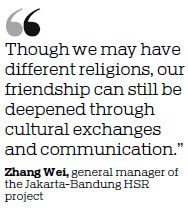
"I don't feel working here is anything different from working in an Indonesian company, but I do get to see a lot of new machines here," said Nandang.
On May 14, the Jakarta-Bandung HSR project marked another milestone with the breakthrough of the Walini Tunnel in West Bandung regency, the first among 13 tunnels in the project.
This Walini Tunnel breakthrough will persuade Indonesian people that having HSR rail in Indonesia is an expectation that can be fulfilled," said Chandra Dwiputra, managing director of KCIC, as quoted by Xinhua News Agency.
Muhamad Abidin, 49, a vehicle dispatcher at the HSR project's concrete mixing station, hopes the project can be completed soon so he can visit his daughter in Jakarta more often.
Though the distance between Jakarta and Bandung is only around 150 km, it can take between three and six hours by car due to traffic congestion. With a maximum speed of 350 km/h, the high-speed link will shorten the travel time between the two cities to about 40 minutes.
"I barely go to Jakarta to see my daughter because the round trip can cost me a whole day, so I only get to see her when she comes back home during holidays," said Muhamad. "When the HSR project is completed, I can go to see her during weekends, which is very convenient."
In the future, Muhamad plans to use his China Railway Group earnings to buy a villa on his home island of Sumatra. "I hope the villa has a nice sea view, and it will be well-decorated and big enough for my whole family," he said.
Confident about completing the project on time, China Railway Group's Zhang said the impact of the HSR line in Indonesia is profound. "As a business-to-business project, the cooperation demonstrates how companies can be the main carrier to promote the Belt and Road Initiative on an economic level," he said.
"We are also open to anyone who is interested in HSR to come and learn (about the project)," said Zhang.
Just outside the Walini Tunnel, an exhibition hall was established to provide information and showcase key technologies used in the Jakarta-Bandung HSR project. More than 1,000 Indonesia students from local universities have visited so far.
"My family and friends are happy that I can have the opportunity to join this massive project in Indonesia," said technician Tinambunan.
"What I have learned here is very helpful for my future career. I am willing to share my experience with others. I am grateful for what my Chinese colleague has taught me," he said, adding that he often goes shopping, watches movies and eats out with his Chinese mentor. "We see each other every day, and now we are just like brothers," he said.
kelly@chinadailyapac.com
|
|
|
|
|
|
|
Staff celebrate on May 14 as the Walini Tunnel was completed. It marked a milestone for the Jakarta-Bandung High-Speed Railway.Provided To China Daily |
(China Daily 05/28/2019 page11)


